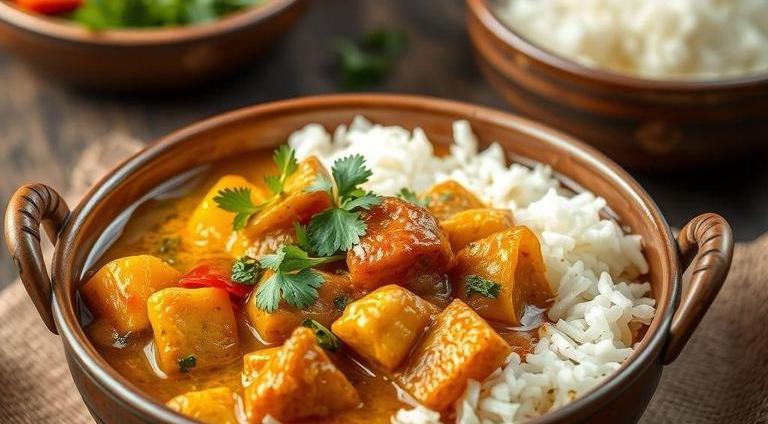Curry, with its aromatic blend of spices, rich textures, and vibrant colors, has become a beloved dish worldwide. Whether it’s a creamy vegetarian curry packed with vegetables or a spicy lentil-based variation, the allure of this dish is undeniable. But just like any other cooked meal, there’s a question that nags at every curry lover: How long can you keep it before it goes bad?
You might be thinking of storing some leftover curry for later or wondering how long it’s safe to eat if you bought it from a restaurant or pre-made. It’s a valid concern because, unlike dry foods, curry is a wet dish with a complex mix of ingredients-each of which might have a different shelf life and spoilage timeline. In this guide, we’ll dive deep into whether vegetarian curry can go bad, how to spot signs of spoilage, and how you can store it properly to maximize its freshness.
Can Vegetarian Curry Go Bad?
Yes, vegetarian curry can absolutely go bad, just like any other cooked dish. While curries often have a long-lasting appeal due to the strong flavors of spices and herbs, the ingredients-whether they’re vegetables, legumes, coconut milk, or dairy-are perishable. Once you cook a curry and it’s exposed to air, bacteria, or temperature fluctuations, the quality starts to degrade, and eventually, the curry will spoil.
- Vegetables and legumes: These perishable ingredients can begin to break down or rot when left out for too long.
- Coconut milk and cream: These fats and liquids spoil quickly, making them vulnerable to sourness or curdling if not stored properly.
- Spices and herbs: While dry spices might last a while, the moisture in the curry can cause them to lose their potency over time, affecting the taste and texture of your curry.
The combination of these ingredients means that, while your curry may stay delicious for a few days, it will eventually reach a point where it’s no longer safe to eat.
Shelf Life For Vegetarian Curry

The shelf life of vegetarian curry largely depends on two things:
- Storage conditions
- Ingredients used
Here’s a breakdown to help you understand how long it lasts under different circumstances:
-
Refrigerated Vegetarian Curry
If stored in an airtight container in the fridge, most vegetarian curries can last 3 to 4 days. You want to make sure that your curry is allowed to cool to room temperature before refrigerating it. This minimizes the risk of bacterial growth from improper cooling.
-
Frozen Vegetarian Curry
Freezing is your best bet for extending the shelf life. Most vegetarian curries can last in the freezer for up to 3 months. Freezing helps preserve the texture and flavor, though ingredients like potatoes or cream-based curries may alter in texture slightly after being frozen and thawed.
-
Takeout Or Pre-packaged Curry
If you’ve bought curry from a restaurant or store, it’s generally good for 2 to 3 days when stored properly in the fridge. Always check the expiration date or follow any handling instructions from the packaging, as store-bought curry can sometimes contain preservatives that help it last longer.
Common Signs Of Spoilage
Knowing when vegetarian curry has gone bad is essential to avoid foodborne illness. Here are the common signs you should watch out for:
-
Off Smell
Fresh curry has a distinctive, aromatic fragrance from its spices and herbs. If it starts to smell sour, rancid, or overly fermented, it’s a clear sign that it has spoiled.
-
Mold Growth
Mold can grow on the surface of curry, especially if it’s been stored improperly or kept for too long. If you see any fuzziness or green/white spots on the curry, toss it immediately.
-
Changes In Texture
If your curry becomes excessively watery, slimy, or if the ingredients start to break down and disintegrate, it’s likely gone bad. The texture of coconut milk curries may also change, turning grainy or curdled.
-
Unusual Taste
A change in taste is another clear indicator. Curry that has spoiled will often have an off, sour, or bitter flavor. If the spice profile is no longer balanced or the curry tastes “off”, it’s best not to risk eating it.
-
Separation
If the liquid components (like coconut milk or tomato-based sauces) have separated dramatically from the solid parts, it might still be safe to eat, but this could also be a sign that the curry is aging and losing its quality.
How To Store Vegetarian Curry?

Proper storage of vegetarian curry can help you preserve it longer and ensure that you enjoy it at its best. Here’s how you can store your curry to avoid spoilage:
-
Cool It Down Quickly
Once your curry has finished cooking, let it cool to room temperature (but not for more than two hours). Placing hot food directly in the fridge can raise the temperature of your fridge and encourage bacterial growth.
-
Use Airtight Containers
Store the curry in airtight containers to keep moisture and air out. Glass jars or plastic food storage containers with tight-fitting lids are ideal. If you plan to freeze it, opt for containers that are specifically designed for freezing.
-
Divide And Conquer
If you have a large amount of curry, consider dividing it into smaller portions. This way, you only need to reheat what you plan to eat, reducing the chance of reheating and cooling repeatedly, which can contribute to spoilage.
-
Label Your Containers
Always label your storage containers with the date the curry was made, so you know how long it’s been in the fridge or freezer. This helps you avoid keeping it too long.
-
Freezing
To freeze your curry, let it cool completely first. Then, transfer it into freezer-safe containers or freezer bags. Be sure to remove as much air as possible to prevent freezer burn. When ready to use, defrost in the fridge overnight and reheat thoroughly.
Expert Tips
To help you extend the shelf life of your vegetarian curry and keep it tasting great, here are some expert storage tips:
-
Use A Thermometer
A food thermometer can help you ensure your curry cools to a safe temperature (below 40°F or 4°C) before refrigerating it.
-
Freeze In Small Portions
Freezing smaller amounts makes it easier to thaw and reheat only what you need, which prevents excess thawing and reheating.
-
Avoid Reheating Multiple Times
While it might seem convenient to keep reheating leftover curry, repeatedly reheating it can break down the flavor and texture. Only reheat the portion you intend to eat and avoid doing so more than once.
-
Consider The Ingredient Mix
Some ingredients in vegetarian curries, like potatoes or delicate greens, may not freeze well. Consider cooking them separately and adding them fresh when you reheat the curry.
-
Use A Slow Cooker Or Instant Pot
If you plan to store curry for multiple meals, cooking in a slow cooker or Instant Pot can help reduce the risk of overcooking or burning while keeping flavors intact.
FAQs
How Long Can Vegetarian Curry Last In The Fridge?
Vegetarian curry typically lasts for about 3 to 4 days in the fridge if stored properly in an airtight container. Ensure that it is cooled down to room temperature before refrigerating to avoid bacterial growth.
Can You Freeze Vegetarian Curry?
Yes, vegetarian curry can be frozen for up to 3 months. To preserve the quality, store it in an airtight container or a freezer-safe bag, leaving some space for expansion as the curry freezes.
What Are The Signs That Vegetarian Curry Has Gone Bad?
Signs that vegetarian curry has gone bad include an off or sour smell, visible mold, or a change in color. If the texture becomes slimy or it has a bitter taste, it is also likely spoiled.
Can Vegetarian Curry Cause Food Poisoning If Left Out Too Long?
Yes, if vegetarian curry is left out at room temperature for more than 2 hours, bacteria can grow rapidly, potentially causing food poisoning. It’s important to refrigerate leftovers promptly to minimize the risk.
How Should I Store Leftover Vegetarian Curry?
Leftover vegetarian curry should be stored in an airtight container in the fridge. For longer storage, you can freeze it, but make sure to cool it down before refrigerating or freezing.
Is It Safe To Eat Vegetarian Curry After 5 Days In The Fridge?
It is generally not recommended to eat vegetarian curry after 5 days in the fridge, even if it still looks and smells fine. After this time, the risk of bacterial growth increases significantly.
How Can I Tell If Vegetarian Curry Is Still Safe To Eat After Freezing?
If frozen properly, vegetarian curry can be safe to eat even after several months. However, check for any signs of freezer burn, changes in texture, or odd smells after thawing, which might indicate it has gone bad.
Can I Reheat Vegetarian Curry More Than Once?
It is not recommended to reheat vegetarian curry more than once, as repeated reheating can promote bacterial growth and reduce its quality. Always heat only the portion you plan to consume.
Does The Type Of Vegetables In Vegetarian Curry Affect How Long It Lasts?
Yes, certain vegetables like spinach or tomatoes can spoil faster than others due to their higher moisture content. Curry with more delicate vegetables might not last as long in the fridge as those with firmer vegetables.
What Should I Do If My Vegetarian Curry Smells Bad?
If your vegetarian curry has a foul odor, it is best to discard it immediately. A sour or rancid smell is a clear indication that the curry has gone bad and should not be consumed.